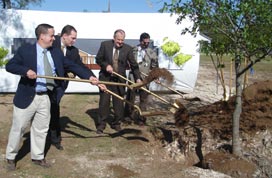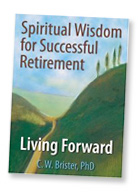Updated: 1/19/07
Reyes sees move to Buckner as natural progression
By Marv Knox
Editor
Although Albert Reyes’ recent career change caught many Texas Baptists by surprise, he sees it as the next step in God’s plan for his life: An opportunity to minister to millions of orphans whose lives may make an impact on the world.
Nearly eight years ago, Reyes became president of Baptist University of the Americas, a multi-cultural training school for ministers in San Antonio. Under his leadership, BUA multiplied its enrollment, gained certification to grant academic degrees, earned national accreditation and launched a campaign to construct a new campus.
Reyes, 48, soon became one of Texas Baptists’ most visible leaders. He served as the first Hispanic president of the Baptist General Convention of Texas. Then he landed on almost anyone’s short list of candidates to succeed Charles Wade as BGCT executive director when Wade retires.
So, many people expressed shock when Reyes decided to join Buckner International as president of Buckner Children & Family Services Jan. 1.
“I saw that this would be a natural progression of what I have been doing—doing something with the life I have left and giving aid to the poorest of the poor,” he reflected.
Actually, Reyes’ new job clearly complements his life mission statement: “To develop kingdom leaders from my circle of influence to the ends of the earth.”
When he was a young church planter in El Paso, Reyes sought to fulfill that mission by leading people to faith in Christ, discipling them and training them to lead others.
At the time, he thought he would retire there, in Texas’ fourth-largest city and a vast Hispanic mission field. “I said, ‘We can do this for the rest of our lives,’” he recalled.
But the presidential search committee from Hispanic Baptist Theological Seminary, as BUA then was called, challenged that notion. Reyes eventually concluded he could fulfill his mission more rapidly by heading the school for Christian leaders. Rather than starting with non-Christians, he would be working with Christians who already knew God wanted them to be ministers.
Reyes hit the ground running in San Antonio. He guided the school through a name change, accreditation, faculty and student expansion, and the first steps of a move to a new, larger campus.
“I was prepared to do whatever I could to ensure our Hispanic community had the opportunity every Baptist has in Texas,” he said. “We had provided non-accredited, non-degreed education (to Hispanics) for 60 years. Why not provide accredited theological education at the undergraduate level focused on cross-cultural Christian leadership? Our students’ challenge never has been intelligence, but opportunity. I went fast because we needed to catch up. We need wave after wave of leaders to come forward.”
Once again, Reyes thought he was set for life. Once again, he thought again.
The process began during his term as BGCT president, when he preached to the convention’s Executive Board about a “Jesus agenda”—ministry to the poor, the children, the widows, the world’s disenfranchised.
But during a BUA chapel service, Reyes acknowledged to himself, “I don’t know if I even know any poor people.” He concluded his ministry at BUA provided new bridges for under-served young people with dreams for higher education and leadership … for those who were economically challenged.
“For most of my ministry, I had been focusing on the seeds of the gospel—on faith—but not on the deeds of the gospel,” he conceded. “But when I learned of the Buckner opportunity, I felt this was doing Jesus’ mission full-throttle, personally impacting the poorest of the poor, children who don’t even have parents.”
That meant turning loose of his leadership at BUA—leadership many of the school’s supporters have felt is vital to its academic and financial success. But Reyes believes this is his time to go.
“God is the one who makes things grow,” Reyes said of the school’s recent transformation and potential for training cross-cultural leadership. He sees his own gifts as being a “catalytic person” who lays the foundation for change. “I’m in my best zone when I’m reformatting, re-engineering, reorganizing a ministry.”
That process has been completed at BUA, he added. “We don’t need a new vision. We pretty well have a pattern set. I feel like I’m finished; I’m done. It’s time to get out of the way” and allow someone with other gifts to fulfill the vision.
Some of Reyes’ friends and admirers have questioned his sense of timing, wondering why he wouldn’t stay at BUA a bit longer, opening the possibility that he could become the BGCT executive director, staff leader of the state convention.
“I’m extremely flattered,” Reyes said of that idea. “Maybe I’m just a bit naïve, but I respond to the opportunities that are there and to the sense of God leading me at the time. I’m not being asked to lead the BGCT; I’m being asked to lead Buckner.”
“The BGCT has tremendous potential,” he noted. “We are going through a transition, a change of identity as a denomination at this critical time in missions history. The future will require a leader who can present a compelling vision of how we can thrive in a postmodern, postdenominational, post-Christian world.”
At this juncture, Reyes interprets his new Buckner responsibility as an opportunity to fulfill his life mission statement all the way “to the ends of the earth.”
He will serve alongside Ken Hall, president of Buckner International, the parent organization that includes Buckner Foundation, the fund-raising component; Buckner Retirement Services, a ministry to senior adults and their families; and Buckner Children & Family Services, which includes a range of ministries to children and their families, including adoption, foster care, emergency and relief care, support for overseas orphanages, and ministry to at-risk children and their families.
“My unique assignment will be to transform Buckner from a Texas-based, Baptist-related institution with national and international ministries, to be a nationally based ministry to children and families with a global reach,” Reyes said.
“Right now, Buckner ministers in cities across the United States and in many cities around the world. The difference will be that we will broaden our base of support and participation across the nation. We will mobilize Christians, churches, colleges and universities, and raise up Christians to say, ‘Let’s bless the nations.’”
Quoting missions researcher Phillip Jenkins, Reyes stressed: “The Third World doesn’t need the gospel. They have the gospel. They need the incarnational gospel. They need our resources, so the presence of Christ can impact their societies.”
Reyes’ eyes light up when he talks about the presence of Christ impacting global societies.
“Think about the leadership potential of 143 million orphans in the world,” he commanded. Buckner doesn’t touch them all, but it touches many.
“We take care of their needs. They are fed, given shoes and, to the best of our ability, provided clothes and foster families,” he said. “I want to push the envelope a bit more and say: ‘What if we were to focus on the leadership potential of those children in those countries? What about their educational opportunities, with nine (Baptist) universities in Texas and others across the country?’ What if we were to say, ‘We will do something about the educational threshhold of these children?’”
The answer to those questions lies in understanding God’s will for American Christians in a hurting world, Reyes observed. “How long is the God of redemptive history and justice going to allow us to have everything? Buckner can be a galvanizing tool to demonstrate what we can do with educational systems, economic strategies and congregational connections so we can fulfill our responsibility to those children.”
Similarly, Buckner’s responsibility is to help children live with families, he added, noting any design to build orphanages for all the world’s orphans is not a good business plan.
“Can we provide (foster and adopted) families for those children?” he asked. The best plan is to develop an economic strategy that will enable families in orphan children’s communities and regions to care for them, he explained.
In addition to education, economics and healthy families, Buckner must help provide churches that will enable all those children to experience the love of Christ, Reyes said.
“We need outposts for the kingdom of God,” he insisted. “Once you do the other (provide education, economic investment, care and families for the children), you’re not going to have any trouble starting churches.”
The key to fulifilling that global vision is working with churches, Reyes reported.
“What is happening in missions today is churches everywhere have said, ‘We have a local identity and a global identity, and we’re going to get on with it,’” he said. “Churches are already taking the lead on mission.”
So, the challenge for missions agencies such as Buckner is to catch up with the churches and enhance their ministries, he added. “It’s not just coming alongside the congregation, but tapping the potential of the members. Most churches only recognize the local half of their identity. The other half is global. Many laypeople already have global resources and connections. How can we connect those resources to what we’re doing?”
Collaboration with churches will produce an effective and efficient—and redemptive—model for bringing the presence of Christ into direct contact with the world’s poorest and most needy people, he predicted.
When Reyes thinks about how much God has blessed Texas Baptists and other U.S. Christians, he recalls Psalm 67. That Scripture says God is gracious to and blesses God’s people so God’s ways will be known on all the earth and so the nations may be glad.
“There is a reason we have what we have: So we can be a blessing to others,” he said. “The nations will be glad when God’s people bless them. We’ve been blessed; we’ve been forgiven; we’ve been given God’s favor. Why? So God’s ways will be known. And if God’s ways are known, then the nations will be glad. …
“Buckner is uniquely positioned to do what Psalm 67 says. And anybody who wants to join is welcome. We’re ready. We’re trying to catch up with what God’s doing.”
And for Reyes, that activity expands Buckner’s ministry all the way “to the ends of the earth.”
News of religion, faith, missions, Bible study and Christian ministry among Baptist churches, in Texas, the BGCT, the nation and around the world.




